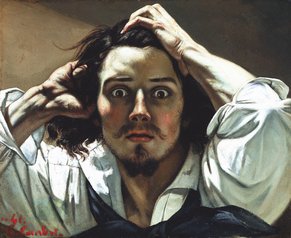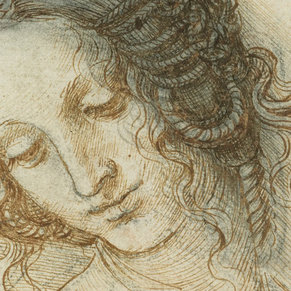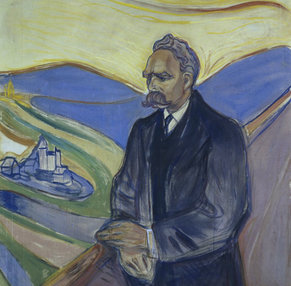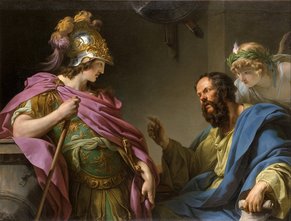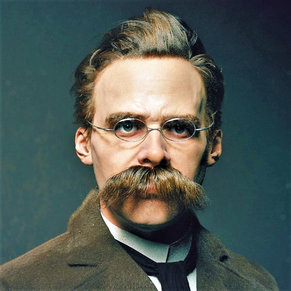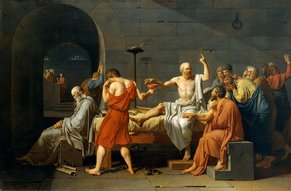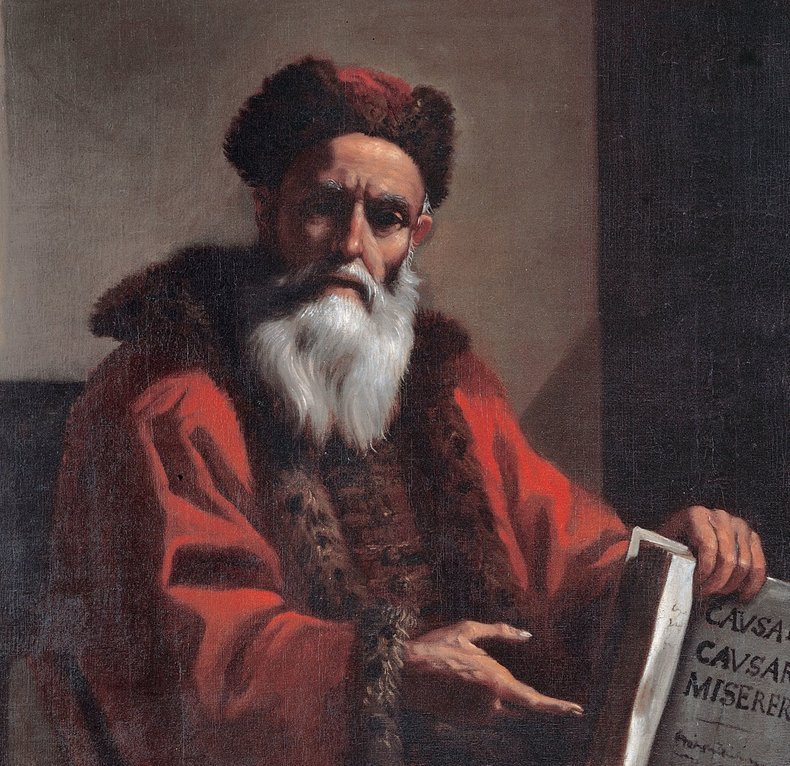
It has always been correct to praise Plato, but not to understand him.Plato was an ancient Greek philosopher who had a large impact on Western philosophy, religion, law, political theory, education and mathematics. He lived in the 5th and 4th century BC and produced an incredible volume of writing including thirty-five dialogues and thirteen letters. The following are some core examples of Plato's contributions to philosophy.
~ Bertrand Russell; History of Western Philosophy
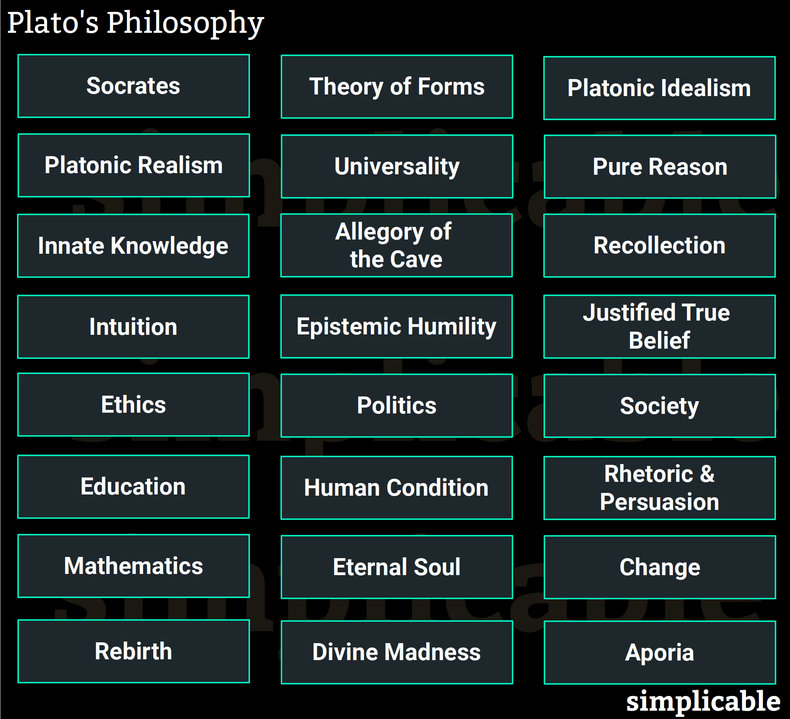
Socrates
With the trial of Socrates, the history of Western political thinking begins. Socrates’s death sparked off Plato’s astonishing philosophical career.Plato was a student of Socrates, another important ancient Greek philosopher. Socrates never wrote anything. Most of what we know about about Socrates comes from Plato. Confusingly, Plato presents many of his own ideas as a dialogue by Socrates. As such, the ideas attributed to Plato may have originated with Socrates and vice versa.
~ Alan Ryan
Theory of Forms
Plato is the essential Buddha-seeker who appears again and again in each generation, moving onward and upward toward the "one."The theory of forms is the idea that the physical world is a mere copy of a series of blueprints known as forms. These forms are immutable, timeless and changeless. Plato views these forms as the foundation of reality. For example, all mountains have a shared form but manifest in great variety in the physical world. According to Plato, to understand all mountains one simply needs to understand their one form.
~ Robert M. Pirsig, Zen and the Art of Motorcycle Maintenance
Platonic Idealism
Wonder is the feeling of a philosopher, and philosophy begins in wonder.The theory of forms is also known as Platonic Idealism. Idealism is the 18th century theory that the physical world is the product of the mind and not the other way around. It should be noted that the theory of forms isn't at all consistent with idealism as it views the mind as simply another element of the physical world. In other words, the theory of forms doesn't ascribe the mind the power to create reality as forms are timeless and unchangeable.
Plato, Theaetetus
Platonic Realism
Beholding beauty with the eye of the mind, he will be enabled to bring forth, not images of beauty, but realities ...Yet another common term for the theory of forms is Platonic Realism. Realism is the theory that the physical universe exists and has its own nature that isn't affected by our mind. Plato's theory of forms is fully compatible with realism and is inconsistent with idealism. As such, this is the more accurate description.
~ Plato, The Symposium
Universality
Plato's discovery went as follows. It is possible for something to be a certain way and for something else to be the same way. So, there are universals.Plato views forms as universal truths. As such, Plato doesn't support the postmodern idea of relativism -- the theory that universal truths don't exist.
~ David Stove
Pure Reason
After much effort, as names, definitions, sights, and other data of sense, are brought into contact and friction ... a sudden flash there shines forth understanding about every problem, and an intelligence whose efforts reach the furthest limits of human powers.Pure reason is the formation of theories that are completely detached from the practicalities of the physical world. For example, devising a rule of mathematics from pure theory that can later be used to describe and predict the real world. Plato and Socrates are arguably two of the founders of pure reason.
~ Plato, The 7th Epistle
Innate Knowledge
It would be better for me … that multitudes of men should disagree with me rather than that I, being one, should be out of harmony with myself.Plato views the forms as the root of all knowledge that can be obtained with a process of introspection. He portrays experience and observation as a deeply flawed method for discovering knowledge.
~ Socrates by Plato, Gorgias
Allegory of the Cave
... the truth would be literally nothing but the shadows ...The Allegory of the Cave is a complex analogy that Plato uses to convey his theory of forms. It involves prisoners chained to a wall in a cave who see nothing but shadows of things passing outside. They construct a reality based on different shapes of shadows. When they escape to the outside world they realize that their reality is completely wrong. Reading the shadows on the wall represents empirical knowledge gained with experience, observation and measurement. The outside world is the use of pure reasoning to understand forms. In other words, Plato views the physical world as shadows cast by universal, unchanging truths he refers to as forms.
~ Plato, Republic
Recollection
Plato taught that in the Rebirth, the soul was generally unconscious of its previous lives, although it may have flashes of recollection...Plato describes the process of pure logic as trying to remember what you knew before you were born. He terms this process recollection. For example, in Plato's dialogues Socrates elicits a fact concerning a theory of geometry from a slave boy. The suggestion here is that the boy retains a talent for pure reasoning due to a lack of experience and education.
~ William Walker Atkinson
Intuition
Just in the same way did Plato, abandoning the world of sense because of the narrow limits it sets to the understanding, venture upon the wings of ideas beyond it, into the void space of pure intellect.Plato and his mentor Socrates view intuition as a source of pure reason that provides direct knowledge of forms.
~ Immanuel Kant, Critique of Pure Reason
Epistemic Humility
I myself know nothing, except just a little, enough to extract an argument from another man who is wise and to receive it fairly.The idea that wisdom stems from knowing what you do not know with humility. This is considered one of the greatest contributions of Socrates that is presented by Plato. Plato himself was much more given to making authoritative statements but did so mostly through dialogues such that it is unclear if they are rhetorical devices.
~ Socrates from Plato, Theaetetus
Justified True Belief
Plato was the most artistic of philosophers, and, among men of great eminence, one of the worst of investigators.Plato presents a mostly mystical view of knowledge and directly criticizes knowledge that stems from experience and observation. As this is wholly inconsistent with modern views of knowledge, there has been much made of a few entries in Plato's work that suggest that opinions need to be "justified" to be considered true knowledge.
~ George Henry Lewes
Ethics
God is not the author of all things, but of good only.The basis of Plato's views on ethics is a form he calls the Good. As with other forms, this is innate knowledge that can be discovered by all with a process of introspection, recollection and intuition. Interesting, Plato and Socrates assert that nobody knowingly does wrong. This implies that knowledge is virtue and that evil is only ignorance.
~ Plato, The Republic
Politics
Plato was very outspoken. He planned a system ruled exclusively by philosophers. He wanted to eliminate all individual rights and decisions.Plato believes that an aristocracy by a philosopher king is the best form of government. He views other forms of government as a state of decay and decline that progresses from aristocracy (rule by an enlightened philosopher) to timocracy (rule by honorable warriors) to oligarchy (rule by a few wealthy families) to democracy (rule by the people) to tyranny (rule by the worst individual, a tyrant). In other words, he believes that philosophers like himself should rule with absolute power. He views democracy as the last dark step before tyranny.
~ Ludwig von Mises
Society
Plato had defined Man as an animal, biped and featherless, and was applauded. Diogenes plucked a fowl and brought it into the lecture-room with the words, "Behold Plato's man!"Plato views an ideal society as having three classes: philosopher kings, guardians and workers corresponding to three elements of the soul reason, spirit and appetite. The philosopher kings are a political class and the guardians are a warrior class. He expresses doubt that other classes can understand philosophy. For example, in the Allegory of the Cave the prisoners have no interest in leaving the cave after one prisoner escapes and returns with news of the outside world.
~ Diogenes of Sinope
Education
... knowledge which is acquired under compulsion obtains no hold on the mind.Plato views education as a freedom that is a self-directed exploration as opposed to a system or obligation. Plato's Socrates mocks men who hire accomplished tutors for their sons and views knowledge and virtue as divine gifts that can be lost with a prestigious education.
Plato, Republic
Human Condition
Like cattle, always looking downward with their heads bent toward the ground and the banquet tables, they feed, fatten, and fornicate. In order to increase their possessions they kick ... insatiable as they are.Plato frequently laments the human condition including greed, gluttony, sloth and ignorance. It is tempting to speculate how this may have influenced later Western religion and culture such as the Christian idea of the seven deadly sins.
~ Plato, Republic
Rhetoric & Persuasion
... the rhetorician's business is not to instruct a law court or a public meeting in matters of right and wrong, but only to make them believe.Plato is critical of rhetoric and persuasion as the means for discovering knowledge, law, choosing politicians or making decisions. He advocates for pure reasoning over convincing arguments.
~ Plato, Gorgias
Mathematics
He filled his writings with mathematical discoveries, and exhibited on every occasion the remarkable connection between mathematics and philosophy.Plato's most important contribution to mathematics was the idea of forms -- that perfect mathematical objects such as numbers and sets exist independently of human thought or practical applications.
~ Eudemus of Rhodes
Eternal Soul
It would be a hard task to discover the maker and father of this universe of ours, and even if we did find him, it would be impossible to speak of him to everyone.Plato views humans as having a physical body that is changing and ultimately temporary and a soul that is changeless and eternal. He also proposes many religious theories. For example, in Timaeus he outlines the origin of the universe in a long monologue. Plato has been used as a reference by religious scholars in the West for 2400 years. His philosophy influenced early Christianity and continued to have significant influence on Christian and Jewish theologians throughout the middle ages.
~ Plato, Timaeus
Change
What Plato lacks above all, perhaps, is the Heracleitean sense of flux and change; he is too anxious to have the moving picture of this world become a fixed and still tableau.Plato is unusual in that he views all things as changeless. For example, he presents the soul as being unchanging. This strikes many as an odd view that appears to render life as static and pointless.
~ Will Durant, The Story of Philosophy
Rebirth
Plato was synthesis of Europe and Asia, and a decidedly Oriental element pervades his philosophy, giving it a sunrise color.Plato and Socrates contemplate the possibility of rebirth but never propose anything as detailed as a theory of reincarnation. The works of Plato contain elements of mysticism including the basic idea that all knowledge can be found from within. Plato introduces a state of non-being he refers to as Khora that resembles advanced concepts in Eastern religions such as the idea of nothingness in Taoism.
~ Ralph Waldo Emerson
Divine Madness
...the madness of love is the greatest of heaven's blessings ...Plato views elements of human culture and behavior such as music and love as a type of divine madness that originates with the Nine Muses of Greek Mythology. He views these things as beyond reason but of great value nonetheless. This being said, Plato appears to have been quite serious himself. Socrates was much more of a character who was willing to embrace divine madness in his own life.
~ Plato, Phaedrus
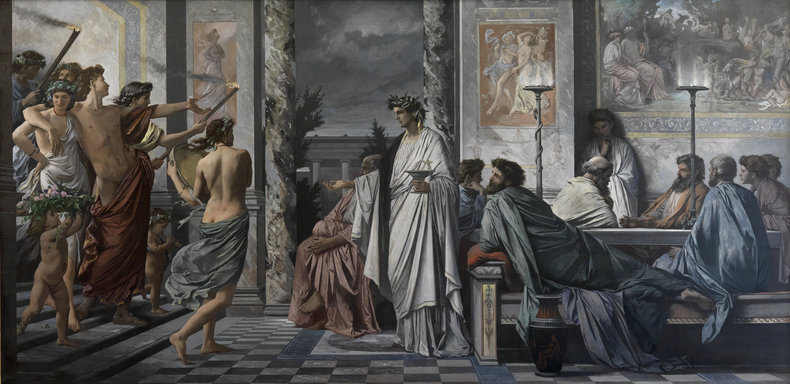
Aporia
All that is said by any of us can only be imitation and representation.Aporia is a rhetorical device that expresses real or pretended doubt about something as a means of persuasion. Plato does this quite a bit whereby he occasionally appears to refute his own theories without any conclusion. This is one of the many reasons that Plato is an extremely challenging philosopher to understand. This alongside the incredible breadth of subjects he covers that include theories of philosophy, religion, politics, society, law, knowledge, education and mathematics. The other factor that makes Plato a challenge is his use of dialogues by Socrates such that it is unclear which ideas are his own.
~ Plato, Critias
Notes
A few additional quotes about Plato:Regrettably, Plato provided a philosophical and intellectual brew for a utopian society that would influence tyrannies for centuries to come.
~ Mark R. Levin
Plato is boring.
~ Friedrich Nietzsche, Twilight of the Idols
Plato tried to implicate Socrates in his grandiose attempt to construct the theory of the arrested society ; and he had no difficulty in succeeding, for Socrates was dead.
~ Karl Popper
I cannot doubt the fact of Plato's betrayal, nor that his use of Socrates as the main speaker of the Republic was the most successful attempt to implicate him.
~ Karl Popper
Socrates had refused to compromise his personal integrity. Plato, with all his uncompromising canvas-cleaning, was led along a path on which he compromised his integrity with every step he took.
~ Karl Popper
... [Plato] was a disgruntled old man, full of political rancor, fearing and hating the crowd and above all their demagogues; his prejudices had crystallized and he had become an old doctrinaire, unable to see anything but the reflections of his own personality and to hear anything but the echoes of his own thoughts.
~ George Sarton, A History of Science
| Overview: Plato Philosophy | ||
Type | ||
Period | 427 to 347 BCEstimates of Plato's lifespan vary by several years. | |
Related Concepts | ||

